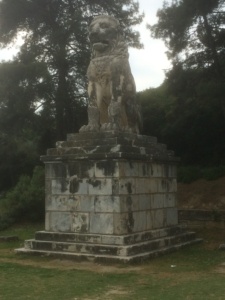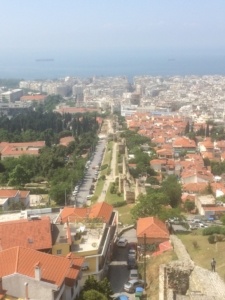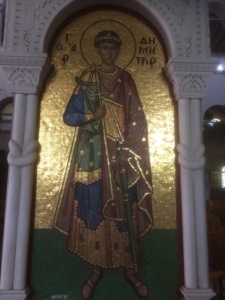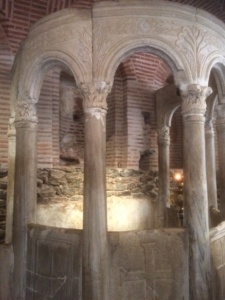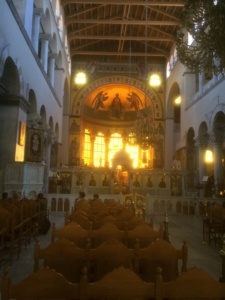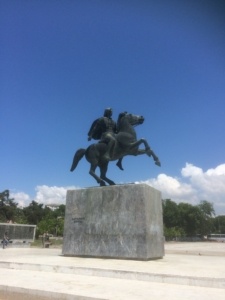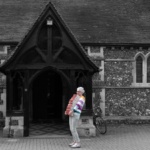Over four talks Bishop Steven is exploring God’s mission in Macedonia, in Greece and in the great city of Ephesus. In session one we discovered the first two principles of deep water fishing: the Holy Spirit directs and inspires new movements of mission, and God is already at work in unexpected places and unexpected people. In session two we travel to Greece and the story of how the disciples put out into deep water in strange cities where no-one had ever proclaimed Christ…
This page includes images and text by the Revd Janet Minkkinen of St Andrew’s Church Cippenham who is on pilgrimage. If you would prefer to watch +Steven teach this session, scroll to the bottom of this page for the video.
Session 2: Greece
Luke describes in Acts the different ways in which Paul and his companions put out into deep water and let down the nets. Luke’s focus in Acts is on evangelism and church planting, but that focus is clearly set within the broader horizon of God’s mission and God’s kingdom.
In Macedonia, we drew out the first two lessons to inspire our own work. The first is that the Holy Spirit directs and inspires new movements of mission. The second is that God is already at work in unexpected places and unexpected people: Lydia and the young girl and the jailer and his family. Renewal in mission is not usually about steady and incremental change. It can often be about deep water and risk and the new thing that God is doing.
From Macedonia, we move on now to Greece. In Acts 17 and 18, Paul moves through four of the major cities of Greece. He visits Thessalonica and begins his mission in the synagogue. This is the pattern familiar from Acts 13 and 14. People come to faith. The Jews become jealous. They drive Paul out from the synagogue then stir up the city authorities against him. You may remember the famous taunt: “Those people who have been turning the world upside down have come here also”.
Silas and Paul move onto Beroea. Here the reception is completely different: “They welcomed the message very eagerly and examined the scriptures every day to see whether these things were so”. The mission here bears fruit until people come from Thessalonica and stir up this city also against Paul.
From Beroea we come to Athens. Paul spends time watching and listening to this city full of idols. He debates not only with the Jews but in the market place with the philosophers. Eventually, he speaks to the assembly on the Areopagus, and we hear for the only time in Acts an address to educated and literate citizens in a famous university city.
But the fruit of this ministry in Athens is meagre. “When they heard of the resurrection of the dead, some scoffed; but others said, “We will hear you again about this”. At that point, Paul left them. But some of them joined him and became believers including Dionysius the Areopagite and a woman named Damaris and others with them”.
There is to be no great intellectual breakthrough in Athens.
Then finally in Greece, Paul comes to Corinth where he is to stay for 18 months to found the Church with his colleagues Priscilla and Aquila. We know about Paul’s ministry here from the Corinthian letters as well as from Acts 18. The church here is a church of and for the poor. The ministry here is a much more fruitful ministry. The Lord appears to Paul in a vision and says this: “Do not be afraid but speak and do not be silent; for I am with you, and no one will lay a hand on you to harm you, for there are many in this city who are my people”. He stayed there for a year and six months, teaching the word of God among them.
Again and again, the disciples put out into deep water in strange cities where no-one has ever proclaimed Christ. Paul and his companions are doing what Jesus commands Peter to do in Luke 5. Paul and his companions are doing what we are called to do in Amersham and Didcot and Charlbury and Ascot.
What lessons can we learn? There are of course three I want to highlight, though I haven’t managed to make them begin with the same letter. They all seem to me to be very important to our work.
(scroll down to continue)
Janet writes: “We missed out the towns of Amphipolis and Apollonia, but stopped to see this huge statue of a Lion that Paul must have seen. The Lions are normally in places where battles have taken place in about 300BC. From there we made our way into Thessaloniki named after Alexandra’s the Great sister. In Thessaloniki Paul tries to explain that Christ first had to suffer and then be resurrected from the dead. Some were persuaded, but many were unhappy with his words of hope. As Bishop Steven reflects on the deep water that we are to go out into, we also need that steadfast hope and trust so that we too are faithful to the truth. I visited the church of St Demetrios coming face to face with his relics. His witness and martyrdom makes you reflect, that is very very deep water. Many Christians around are world are persecuted for their faith and belief in Jesus Christ and refusing to be silent. I feel humbled and pray for courage.” – 14 May 2019
Principle number 3: different places respond in different ways
(see the previous talk for principles one and two)
The first is simply stated but really difficult to take on board for all of us. The same gospel proclaimed by the same people in different places provokes a very different response:
Rejection in Thessalonica, a warm welcome in Beroea. Indifference in Athens. Passionate welcome in Corinth. Different places respond in different ways to the gospel.
We can’t always see the reason for this, especially if we don’t have ourselves wide experience of the church in different places.
As you will know, I served for seven years as the Bishop of Sheffield. Church attendance is very low in Sheffield per head of population. If you go back in time and look at figures from the past, it remains historically very low across all denominations. No-one quite understands why. Whatever is happening in the wider world and whatever strategies are adopted, relatively low church attendance remains.
Within our own Diocese, we have at least two areas, South Bucks and the city of Oxford, where church attendance and churchgoing remains high relative to national trends. It’s possible to point to some reasons for that. But we also have other areas where attendance is as low as anywhere in the country, particularly in the major conurbations of Reading, Slough and Milton Keynes.
In our many rural areas, congregations are very small relative to urban and suburban communities. But as a proportion of the population, they are often very high, particularly at Christmas and other major festivals.
So as we put out into deep water, we need to expect that the outcomes and the responses will be different in different places. We are not going to see neat and uniform growth. We should not put that burden of expectation on one another. One of the marks of authentic mission will be that the response and fruitfulness will be different in different places.
The Bible uses the agricultural metaphors to understand and describe this. In some places the ground is too hard. It needs to be broken up and ploughed and made ready. In others, the time is right to sow seeds and begin new ministries which may take years to come to fruition. In others, there is a crop ready for harvest. Sometimes we can see this in advance. But most of the time, we can’t.
I don’t think Paul knew that his ministry would be better received in Beroea than in Thessalonica. I don’t think he would have changed his itinerary if he did know that.
Now we love as a church to measure outcomes. This is largely a product of our insecurity. Like our forebears, we seek validation in numbers. We love to compare one ministry and place with another. Sometimes we do it to bolster our confidence and because we need the affirmation. Sometimes we do it to pull ourselves down and prove again to ourselves that we have failed or that our ministry is not of value.
I have a friend who worked in inner-city ministry, and he would often say that when suburban clergy get together, they play the game of my congregation is bigger than your congregation. When inner-city clergy get together, they play a different game: my area is worse than your area – a kind of clerical version of Monty Python’s sketch of the four Yorkshireman. “Outside toilets. You were lucky.”
We need to be prepared for the outcomes to be different – some more difficult, others more positive and fruitful and affirm both. That’s one of many reasons why beginning with appreciative inquiry [expect to see more about appreciative inquiry from the Diocese in the coming weeks] and affirmation seems the right way to plan.
One of the things I have heard very clearly across such a large Diocese is that we must be very wary about transferring unrealistic expectations from one part of the Diocese to another which then become impossible burdens and sap the confidence of the church.
It’s wonderful that as a Diocese we have several large churches in the centre of Oxford. I praise God for them. But we cannot take the expectations of growth and success in those large churches and transfer them onto small congregations in rural West Berkshire. The soil is very different. The resources are different. The story is different. Acts underlines this again and again.
The rural church is very different from the suburban church. The inner city is different from the suburbs. Inner city Slough is different from Blackbird Leys on the edge of Oxford though both may be deprived. The Diocese is made up of thousands of different places, each with its own story and its own response to the gospel. God is at work in each. But we must avoid the temptation to standardise, to project expectations. We must allow for difference.
Principle number 4: we need to be courageous
My second lesson for deep water fishing from Greece is the lesson that we need to be courageous, to persevere and try again. We need this courage especially in respect of past failure whether that is specific failures in mission or the general climate where ministry has not been fruitful or particular failures such as safeguarding or division in the life of the Church.
All of these things sap our confidence and morale. When confidence and morale and hope are low, it is really very hard to get out the boats and put out into deep water and let down the nets.
Imagine the courage and confidence required by Paul in these two transitions. He moves from Thessalonica where there has been hostility and rejection and apparent failure to Bereoa. He is not to know as he walks into Bereoa that things will be different. But they are, at least for a while.
Even more, imagine the courage and confidence to move from Athens to Corinth. Paul has been mocked in Athens in a very public court appearance. There has been very little fruit. He gathers himself and finds the courage to put out into deep water again and goes to Corinth. There are signs he does some things differently. There is a much greater emphasis on teamwork rather than a solo mission. There are signs in I Corinthians that there was a major shift in his preaching and teaching. This is how Paul describes in his own words the beginnings of his ministry in Corinth:
“When I came to you brothers and sisters, I did not come proclaiming the mystery of God to you in lofty words of wisdom”. You might think this was exactly what he was trying to do in Athens.
“For I decided to know nothing among you except Jesus Christ, and him crucified. And I came to you in weakness and in fear and in much trembling” (I Corinthians 2.1-3).
It’s really difficult to find the courage to start again. It’s especially difficult to find the energy to start again in a completely different place: not to simply do again what you have always done but slightly differently.
We all know the answer to the question how many PCC members does it take to change a lightbulb?
Answer: Change?
Or the story of the Yorkshire bishop who asked a churchwarden how many years he had been in office. ’40 years’ came the reply. ‘You must have seen a great many changes in that time said the Bishop’. ‘Aye,’ said the Warden. And I’ve opposed every single one of them’.
Hats off to clergy and PCCs who are bold enough to put out into deep water. To the young mum who dares to suggest employing a families worker. To the curate who leads an environmental audit. To the Vicar who raises the question of a new informal service in a rural benefice. It’s not easy to start again. We need to cherish every person who has the passion and boldness to make a suggestion and cherish even more the person who rolls up their sleeves to have a go.
I’ve been reflecting recently on the next steps in renewing catechesis across the Diocese: the ministry of welcome and accompanying new Christians to baptism and confirmation. It’s such a key ministry for the renewal of our mission.
We have a long way to go.
I think one of the chief obstacles is a lack of courage and confidence. Offering an annual way in which people can learn about faith and explore as enquirers feels in too many places a very significant risk for the clergy. What if I offer this and no-one comes? What if they come and no-one comes to faith?
It won’t be the same in every place, but we need to encourage one another. That again is why it is so important to root all of our planning and ventures in encouragement and affirmation and building hope and confidence in the people of God. The local church is not a problem to be solved. In the present context, clergy and congregations need nurture and inspiration to get back into the boat, to put out into deep water and to let down the nets.
Nobody can read Acts 17 and 18 and say Paul had an easy ride. We can read Acts 17 and 18 and see that there is an iron determination in Paul’s mission simply to keep going, as Paul will say later, to fulfil the ministry which God has entrusted to him. We need that iron determination that dogged perseverance in God’s mission across this Diocese.
Let us pray.
God of love
The sea is so great and our boat is so small.
Inspire your church as we put out into deep water
Help us to be contemplative, compassionate and courageous in your mission.
Guide us by your Spirit to discover where you are working
Help us to join in the building of your kingdom
And anoint us afresh to make disciples in your name
For the sake of your Son Jesus Christ who calls us and sends us
With you and the Holy Spirit, one God now and for ever. Amen.
+Steven
Common Vision Conference
High Leigh, 9 May 2019
Watch Bishop Steven deliver this talk
This session was first given at the Common Vision Conference in May 2019.
Click the speaker icon in the bottom right of the video frame to switch on audio.


